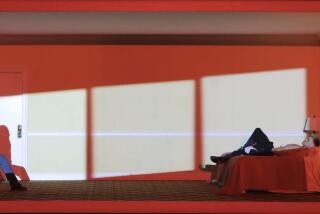Music : Zajick in Ambassador Recital
- Share via
Vocally powerful and self-assured, Dolora Zajick is a still-young singer of international repute and accomplishment. For the better part of the last decade, she has been hailed as the natural successor to the great dramatic mezzo-sopranos of the past. She has not yet made a great number of recordings, but those few already released seem to restate her vocal promise.
One who had heard Zajick only in one of her strong roles--Azucena with San Diego Opera three springs ago--could not have been prepared, then, for the great disappointment of encountering her in recital.
Whatever her other accomplishments, the 37-year-old American singer as a recitalist seems to be stuck on the first rung of the artistic ladder.
At her debut appearance at Ambassador Auditorium in Pasadena, Saturday night, Zajick gave an impressive--if inconsistent--account of her operatic abilities. At the end of the evening, after she had completed the printed program, she offered as her single encore a full blast at “O don fatale” from Verdi’s “Don Carlo.”
It was her finest moment, loud and crude but thrillingly resonant and healthy-sounding. There was no pathos in “O mia Regina,” or hint of terror in the finale, but plenty of ring and bright vocalism where required.
She also made admirable and heroic sounds in the Russian equivalent of “Adieu, forets” from Tchaikovsky’s “Jeanne d’Arc,” and “O mio Fernando” from Donizetti’s “La Favorita,” though she chose--or was unable--to make the quiet parts of those arias effective in dramatic or touching ways.
But the rest of the evening--untroubled by musical sophistication, uninformed by rhythmic definition, innocent of nuance and uncomplicated by word-savoring--threatened to depress even the most optimistic and forgiving music-lover and recital attendee. It simply had minimal artistic content.
Among other miscalculations was the program itself, a hodgepodge of well-known songs and arias by Handel, Lotti, Wolf, Brahms, Ives, Tchaikovsky and Rachmaninoff. True, it built nicely to its climactic points, but it did not offer novel, or probing or even interesting musical insights.
In fact, Zajick and her primitive accompanist, pianist Ted Puffer, ran through this agenda unaffectionately, going for the loud and letting other musical chips fall where they may. Indeed, with his very heavy pedal foot and an ear-opening disregard for pianistic niceties, Puffer seemed the very model of the insensitive coach-accompanist.
More to Read
The biggest entertainment stories
Get our big stories about Hollywood, film, television, music, arts, culture and more right in your inbox as soon as they publish.
You may occasionally receive promotional content from the Los Angeles Times.










